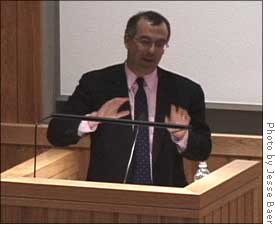| << Front page | News | March 19, 2004 |
David Brooks predicts 2004
New York Times conservative addresses election
By Cecilia Hayford
 |
||
| Kerry in 2004?: David Brooks explains how Bush’s “shapeless” domestic policies may give Kerry a victory. | ||
A self-described “Teddy Roosevelt Republican,” David Brooks has been a critic of the polarized American electorate in his New York Times column and his numerous radio and television posts.
In his Tuesday talk, peppered with witty sociopolitical commentary he described the two biggest changes in the electorate leading to the polarization of the electorate, demographic changes in education and geography.
The rise in the percentage of Americans with a college degree has been directly responsible for the increase in straight-ticket voting, he said.
“Educated people tend to ask themselves the question ‘Am I a liberal or a conservative?’ and then vote based on that,” Brooks said. In response to the decrease in the number of swing voters from about 20 percent in the late 1970s to 8 percent now, the parties have shifted their focus from converting the relatively scant undecided voters to energizing their respective bases, because intense belief in a position gets people to vote. As a result, “more and more people accept the whole party platform,” and the Democrats and Republicans don’t talk to each other.
Geographical segmentation has also contributed to the division in the American public, Brooks said.
“As people become less tied to farms or factories for their livelihood, and as better transportation and communication technologies have increased geographic mobility, they have moved to be in communities of people like themselves,” Brooks said. “Politics has become something that is not about ideas, but identity.”
Part of the segmentation has occurred with the increasing suburbanization of America. “People are moving from the city to the suburbs and from the suburbs to the exurbs,” Brooks said. Brooks sees suburban subcategories as pivotal to the new political landscape.
“The close-in suburbs are home to urban hipsters who have kids and move out of the city, but want to live close to panhandlers so that they can still feel gritty,” Brooks said. “Dean did well in these neighborhoods.”
Slightly further out are the upper-middle class professionals. He described, “People who have high incomes, but worry about income inequality. Ubermoms, who used to be leaders of Fortune 500 companies and now use their 90 thousand dollar educations to raise their little ones, voted primarily Republican until about 25 years ago and are now solidly Democratic.”
“The edges of the metropolitan area, or exurbs, are communities where people share the values of neatness and organization,” Brooks said. “Here among the Wal-Marts and Old Navys are people who moved to their communities looking for something wholesome, with lots of megachurches. They are bourgeois, with high-income equality, and they aren’t terribly ideological. These are the people who voted for Bush’s compassionate conservatism in 2000 even if they agreed more with the Democrats on policy, because they found Gore condescending.”
For all of his focus on socioeconomic dynamics, Brooks’ interpretation of the prospects for 2004 was surprisingly simple: that Bush’s “shapeless” domestic policy might allow Kerry to win the election. The Administration, in Brooks’ view, lacks even a coherent “domestic policy process.”
At the end of the lecture, Brooks explained his own conservatism, based on two issues that changed his worldview.
First, he came to the conclusion that the urban problems that he saw while working as a reporter in Chicago could only be solved by “creating policies that would create virtuous habits,” rather than, as he put it, “throwing money at poverty.”
Second, he believes that the Soviet Union was a “truly monstrous, evil thing,” and that while “Reagan and Goldwater were too soft on them,” he felt that they understood the problem better than the liberals did.
He feels that U.S. foreign policy should be based on the idea that “every person is endowed with ‘inalienable rights,’ and if their government isn’t respecting that, we fix that problem.”
About us
Subscriptions
Advertising
|